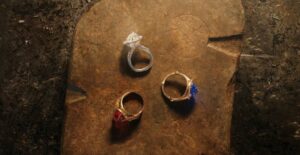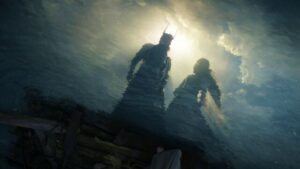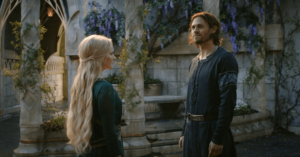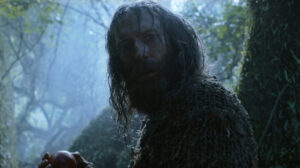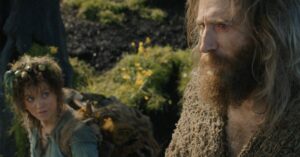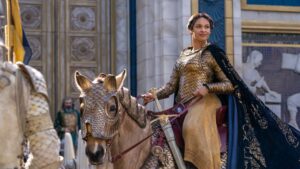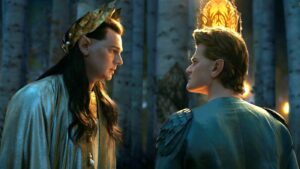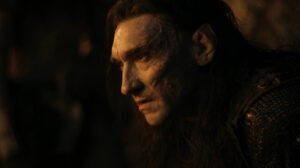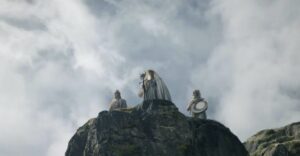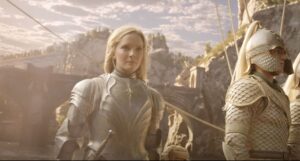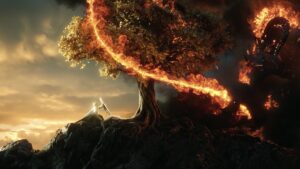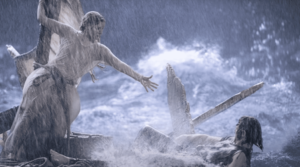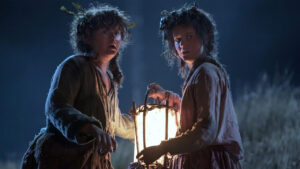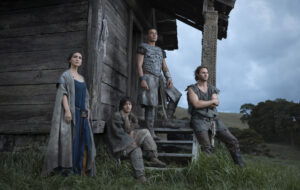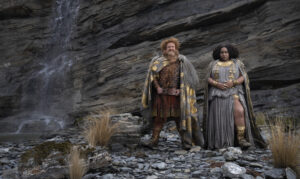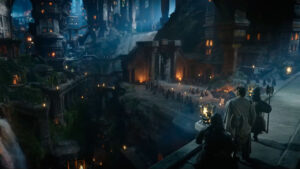It’s not official just yet, but I think it’s pretty safe to assume that 2024 will be the year that Amazon’s The Lord Of The Rings: The Rings Of Power returns for its second season – filming had already wrapped prior to the SAG-AFTRA strikes that shut down much of Hollywood, post-production is now well underway, and there probably won’t be anywhere near as lengthy a marketing campaign as there was for the first season of the epic fantasy series, which kicked off with a Super Bowl teaser trailer months ahead of its September release to drum up anticipation for Amazon’s expensive venture into Middle-earth. Reception to the first season was mixed, with many critics and viewers praising the grand scale, breathtaking visual effects, and brilliant score, but criticizing the series’ large number of underdeveloped characters and disparate subplots, while hardcore fans of the source material, J.R.R. Tolkien’s Appendices to The Lord Of The Rings, complained of just about any divergence from the text, but in some cases understandably: certain changes came across as both needless and potentially damaging.
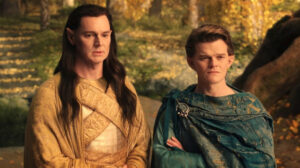
With all that said, I remain optimistic about the second season for a few reasons. Firstly, because I’m a huge fan of The Lord Of The Rings, so I will go into nearly any adaptation of the work wanting it to be good, and hoping for the best. Secondly, because the showrunners have had time and opportunity to take all of our feedback into account, and there are indications that the second season is focused on the characters and stories that fans wanted more of, including Celebrimbor, Sauron, and the Rings of Power themselves. Thirdly, and perhaps naively, because I had similar feelings about The Wheel Of Time‘s first season, and then season two came along and was just phenomenal. Thus, I present you with the ten things I’m most hyped to see from The Rings Of Power season two.
10: Celeborn
Look, I have no doubt that Bridgerton‘s Calam Lynch will be a truly endearing Celeborn, or that his romantic chemistry with Morfydd Clark’s Galadriel will be absolutely magical. But he is still playing Celeborn, who I know as the vaguely xenophobic, almost curmudgeonly character he had become by the time the Fellowship of the Ring rolled up to Caras Galadhon and met him and Galadriel at the end of the Third Age. Granted, that’s roughly three-thousand years after the events of The Rings Of Power, which is set during the Second Age, but even then, in Unfinished Tales, Celeborn is recorded as having traveled over the Misty Mountains to and from Lórien while Galadriel took the much shorter route through the underground Dwarven kingdom of Khazad-dûm, because he couldn’t stand Dwarves. Sure, his resentment towards them goes back to the Sack of Menegroth and the murder of his cousin Elu Thingol, but Thingol was denying payment to his Dwarven workers who were being commissioned to turn one of their own ancestral heirlooms, the Nauglamir, into a piece of pretty jewelry for the Elven-king. Anyway, I’m just saying that The Rings Of Power will have to actively work to make Celeborn less of a jerk, because it’s one of the few personality-traits Tolkien ever gave him (he is, essentially, what Peter Jackson’s films made Elrond out to be).
9: Politics In Khazad-Dûm
Speaking of the Dwarves, the last time we checked in on their subplot in the first season, Crown Prince Durin IV and his wife Disa were plotting to transform the isolated kingdom of Khazad-dûm into the flourishing hub of trade and commerce we know it will become, if only briefly. As long as Durin’s stalwart father Durin III is seated on the throne, they can’t do much, but that’s where I think the legendary Dwarven craftsman Narvi (to be played by Shadow And Bone‘s Kevin Eldon) will enter the picture in season two, as an influential ally to the Prince and Princess. Tolkien tells us that Narvi became a close friend of Celebrimbor and with his help designed the password-sealed doors that would protect Khazad-dûm’s secrets for many centuries after their deaths and the kingdom’s destruction from within. I think it’s highly likely that in the show, Narvi will also assist Celebrimbor in the forging of seven Rings of Power for the Dwarves, and in their distribution to the great lords representing each of the seven Dwarven clans. But it will be the ambitious and forward-thinking Durin IV on whose finger he places a Ring, the very Ring that would later be passed down to Thrór, the father of Thorin Oakenshield, and ripped away from him after much torment in the pits of Dol Guldur, to join the bouquet of stolen rings on Sauron’s hand.
8: Mithril
Mithril is a bit of a controversial topic in the Tolkien fandom nowadays, thanks to The Rings Of Power‘s bizarre invention of an admittedly apocryphal, plothole-ridden origin story for the precious metal, involving a Silmaril, a Balrog, an unnamed Elven warrior, and a tree growing in the Misty Mountains. Don’t even ask. It’s a hard sell, but I’m ready to accept that mithril (in the show; this is nowhere implied in the books) contains a reflection of the purifying light of a Silmaril, and could therefore slow or halt the erosion of Elvendom for a time. Obviously not forever, because, well…we know it doesn’t, but maybe the Elves could scrape by for a few extra years by adorning themselves and their abodes in mithril. So that’s what I want to see. I want the paranoid obsession with this metal’s supposed death-defying properties to have fully set in, and for Elven lords like Gil-galad and Celebrimbor to be pleading with the Dwarves to supply them with more, threatening them with war or blockade if they do not. The light of the Silmarils inspired in the Elves an insatiable lust that drove them to defy the Valar and chase Morgoth halfway across Middle-earth – the effects of mithril will have to be almost as ruinous if I’m to believe they’re one and the same. Also, I just don’t want the costume designers to miss the opportunity to dress all the Elves head-to-toe in mithril‘s radiance.
7: Pelargir
Jumping across the map for a moment, the Númenórean outpost of Pelargir is mentioned near the end of the first season as the next destination for Arondir, Bronwyn, Theo, and the displaced citizens of the Southlands, now Mordor. It’s one of the oldest cities of Men in Middle-earth, predating Osgiliath, Minas Anor (later Minas Tirith), and Minas Ithil (later Minas Morgul). The city sits at a literal and figurative crossroads between the lands of Harad and Khand in the southeast, Númenor in the distant southwest, Mordor in the east, and the lands of Elves in the northwest. It’s going to be a very different environment than what Bronwyn and her son Theo are used to, and I strongly suspect that they’ll end up entangled in the burgeoning conflict between the Númenórean colonizers and the oppressed “Low Men” of Middle-earth. And Sauron’s human form, Halbrand, still believed to be the rightful “King of the Southlands”, will almost surely waltz in at some point and drop the match that starts a firestorm.
6: Númenórean Imperialism
On that note, let’s talk more broadly about the subject of Númenórean imperialism in Middle-earth. Now, one major downside to The Rings Of Power compressing the timeline of the entire Second Age into the span of a single human character’s lifetime, as I’m sure I’ve talked about before, is that we lose the profound sense of the massive scale of Númenor’s empire-building efforts; how long it took them to become a superpower and how long they clung to that power through increasingly brutal methods as successive generations of kings and queens, each one more fearful of death and resentful of the immortal Elves than the one before, took out their anger on those they deemed inferior to themselves just to assure themselves they still could. In The Rings Of Power, all of this history and nuance will have to be crammed into the space of a few years at most, and it gives the show an excuse I hope they don’t take to place the blame for Númenor’s degradation squarely on Ar-Pharazôn, rather than on Númenor itself. Ar-Pharazôn is a symptom of the problem. The problem is Númenórean exceptionalism and racism – which is never treated, and reemerges in the kingdoms of Gondor and Arnor that sprang up after Númenor’s eventual downfall. I’m not particularly confident that The Rings Of Power will address these subjects directly, but I would be ecstatic if it did, and did so well.
5: The Faithful vs The King’s Men
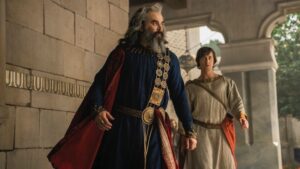
Something I know will be addressed is the divide within Númenor between the followers of Ar-Pharazôn, named the King’s Men, and the so-called Faithful led by Elendil and Tar-Míriel, who wish to reestablish ancient bonds of friendship with the Elves and assist them in their fight against Sauron. I will say something possibly controversial here and point out that while the King’s Men are very much pro-imperialism, the Faithful aren’t exactly anti-imperialism, and ultimately take a very similar approach to dealing with the Men of Middle-earth as the King’s Men, but that’s a whole separate topic and I seriously don’t trust The Rings Of Power to touch on that idea at all. Elendil and Míriel’s joint struggle is not about grappling with the fact that the Faithful are no better, but about accepting the incalculable sacrifices that the way of the Faithful demands – which is also a valid central theme for this subplot, and vaguely more religious.
4: Rhûn
One of the earliest promises made by Rings Of Power showrunners Patrick McKay and J.D. Payne was to more fully explore the lands of Middle-earth that bleed off the sides of the map J.R.R. Tolkien drew and to which he generally constrained the scope of his stories – the lands of Harad, Far Harad, Khand, and Rhûn. Everything that Tolkien wrote about these places and their inhabitants, even combined, is barely enough to fill a single page, as well as being vague and carrying some racist undertones (the question of whether Tolkien was racist has been debated for decades in fandom and academic circles, and is probably impossible to answer definitively – but what is inarguable is that he had the blind-spots typical of even the most well-intentioned Western European white man born in the 19th Century whose primary literary influences growing up would have been mostly other Western European white men). Anyway, I can’t wait to see Rhûn for the first time onscreen alongside Elanor Brandyfoot and the Stranger in season two. The places they visit and the people they meet there will obviously have to be entirely original inventions of the writers, but this is one area of Tolkien’s legendarium that is long overdue for expansion and some revision in the process.
3: Nine Mortal Men Doomed To Die
It’s ironic, given how significant the Rings of Power are to the overarching story of Middle-earth’s Second and Third Ages, that we know so little about most of the Ringbearers. The Three Rings, as we all know, were given out to the wisest and most powerful Elven lords; Gil-galad, Galadriel, and Círdan the Shipwright (who could have been a whole separate entry on this list). The Seven Rings, as mentioned previously, were distributed amongst the mostly unnamed leaders of the seven Dwarven clans. And the Nine Rings were gifted to just about anybody. Okay, so canonically we know they were given to human kings, sorcerers, and warriors, three of whom were Númenórean lords (probably governors of Númenórean colonies in Middle-earth). One was from Rhûn and was named Khamûl (but that name only appears in Unfinished Tales, so Amazon probably doesn’t have permission to use it). The foremost among them was a powerful sorcerer, and probably one of the three Numenoreans, who would go on to become the Witch-king of Angmar (possibly, but not necessarily, indicating a prior connection to that northern region of Middle-earth, which was never a Númenórean colony as far as I’m aware). As these Ringbearers were all personally selected by Sauron with the intention of corrupting them, it is very likely they were chosen for their unique susceptibility to the Shadow. So who among the ensemble cast of The Rings Of Power is a future Ringbearer and Nazgûl? Ar-Pharazôn’s non-canonical, weak-willed son Kemen is a particularly strong candidate, as is Bronwyn’s angsty son Theo – and frankly, Bronwyn herself. Some fans would predictably throw a fit over one of the Nazgûl being a woman, but the Ring-verse refers to Galadriel as an “Elven-king”, and Tolkien used the capitalized word “Men” as an umbrella term for human men and women, so the loophole is there if the writers want to exploit it.
2: Celebrimbor
We didn’t get to see much of him in season one, but I’ve warmed up to Charles Edwards’ characterization of the Elven-smith Celebrimbor. In personality, physical appearance, and demeanor, he’s certainly not at all like the Celebrimbor I picture in my head while reading, but he’s valid, and I actually like him quite a bit now that I think I get what the show is going for with him. That being said, we do need more of him. The story of the Rings of Power is as much his story as it is Galadriel’s or Elrond’s, more so even than either of those characters, and yet the adaptation currently has him relegated to drifting in and out of the peripheries of the tale. I hope that Celebrimbor is spotlighted in season two, because it’s not just that he deserves it, as the literal maker of the Rings of Power, it’s that the show is speed-running through the events of the Second Age so fast that, uh, we may not have much time left with him after this season…if any. There’s a lot to get through, the distribution of the Three Rings, the forging of the Seven and the Nine Rings, the partnership with Narvi and the alliance with Khazad-dûm – and on top of all that, we still don’t actually know Celebrimbor very well in the context of the show, so it would be nice to have some flashbacks or even exposition that gave us more insight into his motives.
1: Annatar

You knew he had to be number one, didn’t you? After taking the form of a scruffy human man named Halbrand throughout the first season, the shapeshifter Sauron will reportedly return with at least two different actors jointly playing the part – Charlie Vickers reprising the role of Halbrand, and Gavi Singh Chera, according to Fellowship Of Fans, appearing in both flashbacks and in Eregion alongside Celebrimbor as the “ethereal”, presumably more Elven-looking original form of the character – which I will go out on a short limb and say is very likely The Rings Of Power‘s amalgamation of Sauron’s angelic first form, Mairon, and the similar fair form he took while dealing with the Elves of Eregion, named Annatar. The latter name only appears in Unfinished Tales and other books to which Amazon does not have the rights, but is apparently being used in some capacity on the series, whether only behind-the-scenes or in dialogue (it wouldn’t be the first time they’ve managed this somehow; they used the name Armenelos in season one, despite it only appearing in The Silmarillion and Unfinished Tales). Not only am I excited for the Annatar storyline to play out, even if it is heavily abbreviated, in general I’m just extremely hyped for another actor’s interpretation of Sauron. The character’s shapeshifting was something I was missing in the first season, and while I’m not familiar with his work, Gavi Singh Chera definitely has the looks and the poise.
The Rings Of Power is such a massive series that I could honestly keep going and going (I didn’t even get to talk about Adar! Expanded storylines for the Orcs! The Mystics! Isildur stranded in Mordor! Aldarion!), but I limited this list to just ten entries. Anyway, I want to hear what’s on your lists now. Share your own thoughts, theories, and opinions, in the comments below!
